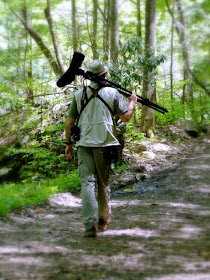
People who know I am into birds, but who aren't themselves sometimes ask me "Are you an orthinologist?" Sometimes they get it right and say "ornithologist." That's the right pronunciation, but the word—in either form—does not apply to me. In order to be an ornithologist in the true definition of the word, one has to study ornithology. I tried this in college at Miami University in Oxford, Ohio. I was there in the early 1980s and, as an avid bird watcher, it seemed completely logical that I would take Ornithology. I applied to take the course as a sophomore and had to get special permission, since it was a course intended for upperclassmen.
Doc O was the ornithology professor at Miami back then. He let me in his class because I said I knew my birds. What I should have said was "I know (and vastly prefer) my birds in the wild, on the wing, flying free." I was good enough in the field that he even let me co-lead some of the class field trips with the class' teaching assistant.
But in the lab, I was lost. I could no more calculate the wing load of a vulture than I could eat what a vulture eats. This should have been fair warning to me. A hint that maybe I wasn't cut out to get a PhD in ornithology.
However I was undaunted. I still thought that in order to be a successful birder, I should apply myself in the ornithological classroom despite the fact that it was as baffling as Keynesian economics to my brain. I was wrestling my grade just north of a B-minus (straight A's in the field quizzes, straight C's in the lab work) when I met my ornithological Waterloo.
There was a field quiz at Hueston Woods State Park. I was leading half of the class. It was a cold but birdy winter morning. We saw a bufflehead. It was listed on the master test list as a hooded merganser. Thinking I was being helpful, I pointed this out. This was not cool.
Due to my inability to excel in the lab, I ended up with a C in ornithology. And here's the report card to prove it. My lowest grade in four years of college. Sweet!

Now you might think that this scarred me for life. That I ran home to my dorm room and burned all my copies of The Wilson Bulletin and The Auk. Quite the contrary. I recycled them.
Seriously, though, I hold ornithologists in the highest possible esteem. Without them and all of the discoveries and knowledge they've shared we'd still be birding in the Dark Ages. No field guides. No grip on bird population trends and endangered species. No conservation plans. No lumps and splits! It's impossible to think of a world without these scientists of birds.
I am happy to my soul that there are ornithologists treading this mortal coil, dedicating their lives and careers to the pursuit—in lab and field—of a greater understanding of birdlife. I respect people who hold vast amounts of bird science in their heads. But I don't wish to be one of them.
The most important thing I learned in Ornithology class? That I'm just a bird watcher. It fits me better. I get to edit my nice little bird magazine. I get to write books and blogs and stuff like that. I get to lead bird walks for people, which I really enjoy doing. And I never have to calculate the wing loading of a turkey vulture. I just get to enjoy watching them fly. Outside, in the field, where I belong.
My name is Bill and I'm a bird watcher.